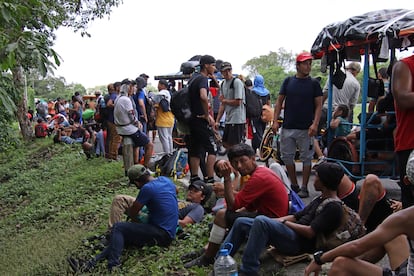Ruling forces Mexico to create a registry of migrant detentions
The Supreme Court has sided with the Jesuit Refugee Service and the Alaíde Foppa Legal Clinic in a landmark decision, mandating reforms to Mexico’s immigration law to curb arbitrary arrests and prevent torture

A ruling by Mexico’s Supreme Court of Justice of the Nation (SCJN) is poised to transform the country’s immigration policies. The court has granted an injunction filed by the Jesuit Refugee Service and the Alaíde Foppa Legal Clinic, meaning immigration laws must be reformed to establish a public registry of detained migrants. This platform must be publicly accessible, and operate like the current National Registry of Detentions, reporting the time, date, location, and authority responsible for each arrest, as well as the immigration station where detainees are transferred. This year alone, 925,000 migrants were detained crossing Mexico, where they face isolation and difficulty accessing legal representation.
For migrants fleeing violence, persecution, or poverty, Mexico has become one of the most dangerous parts of their journey. Often crossing multiple countries and the treacherous Darien jungle, migrants describe Mexico as “the worst part” of this ordeal. In Mexico, migrants have become easy prey for organized crime and corrupt authorities. They face the risk of being kidnapped and imprisoned on the southern border, extorted and murdered by the National Guard, or burned to death in immigration centers on the northern border. Given the growing risks of the journey, this ruling is seen as a victory.
A 2021 report by the Jesuit Migrant Aid Service documented 1,280 migrant disappearances between 2007 and 2021, 75% of which occurred in migration detention centers. These centers, operated by the National Migration Institute, use euphemisms like “assurance” or “encounter” for what is, in reality, detention. The United Nations has established that any place where people cannot voluntarily leave is a place of detention.
Arbitrariness has long dominated the operations of Mexico’s immigration detention centers. Human rights organizations report that migrants are randomly granted or denied the opportunity to contact their families, while others are charged exorbitant fees of 100 pesos (approximately $5) for a mere three-minute phone call. As a result, many migrants remain incommunicado for days or even weeks, effectively vanishing from their families’ lives.
This lack of communication, explains Luis Xavier Carrancá, a lawyer from the Alaíde Foppa Legal Clinic, paves the way for inhumane treatment, including torture and forced disappearances. “The absence of a proper registry also makes it difficult for migrants to access legal representation,” says Carrancá. “It also makes it easier for their detention to be extended indefinitely, because by not registering when they first arrive, Immigration found the perfect formula to skip the legal deadlines in which they should be released.”
In 2019, Mexico amended Article 16 of its Constitution to establish the National Registry of Detentions. The argument was that an updated and comprehensive registry was needed to “prevent the violation of the human rights of the detained person, acts of torture, cruel, inhuman and degrading treatment, or forced disappearance.” However, as lawyer Luis Xavier Carrancá points out, the detention of migrants was “explicitly” excluded from these protections.
The National Law on the Registry of Detentions included an eighth transitory article, mandating Congress to amend the Migration Law within 180 days to create “a registry of detained migrants with the same procedural, protection, and security guarantees as those provided for in this law.” Yet, five years have passed without any progress.
“This omission was the first step toward stripping detained migrants of protection,” explains Carrancá. “It left them outside all constitutional and legal safeguards, because it allowed them to be hidden [from the registry].”
In response to this ongoing issue, the Jesuit Refugee Service, in collaboration with the Alaíde Foppa Legal Clinic of the Ibero-American University, launched a legal strategy to address the lack of protections for detained migrants. In October 2022, they filed an appeal to reform the Migration Law and establish the mandated registry.
Just a few months later, a district judge in Mexico City’s 15th administrative court ruled in their favor, finding that the absence of a registry violated migrants’ right to legal defense. However, the Senate and the Chamber of Deputies appealed the ruling, and the case languished in a collegiate court for 15 months. Finally, in June 2024, the 19th administrative court of the first circuit referred the matter to the Supreme Court.
Last week, the Supreme Court’s second chamber voted on a project prepared by Justice Alberto Pérez Dayán, which upheld the district judge’s decision and declared that Congress had committed a “legislative omission” by failing to comply with the National Law on the Registry of Detentions. The ruling passed with support from Justices Luis María Aguilar, Javier Laynez, and Dayán, while Justices Lenia Batres and Yasmín Esquivel, both closely aligned with the ruling party, dissented.
While the decision mandates Congress to reform the law and establish the registry, the road ahead remains long. The project must now be finalized to incorporate ministerial contributions, after which it will return to the district court responsible for enforcement. The court will then order Congress to enact the necessary reforms. According to lawyer Carrancá, this process could take up to a year to fully materialize.
Sign up for our weekly newsletter to get more English-language news coverage from EL PAÍS USA Edition
Tu suscripción se está usando en otro dispositivo
¿Quieres añadir otro usuario a tu suscripción?
Si continúas leyendo en este dispositivo, no se podrá leer en el otro.
FlechaTu suscripción se está usando en otro dispositivo y solo puedes acceder a EL PAÍS desde un dispositivo a la vez.
Si quieres compartir tu cuenta, cambia tu suscripción a la modalidad Premium, así podrás añadir otro usuario. Cada uno accederá con su propia cuenta de email, lo que os permitirá personalizar vuestra experiencia en EL PAÍS.
¿Tienes una suscripción de empresa? Accede aquí para contratar más cuentas.
En el caso de no saber quién está usando tu cuenta, te recomendamos cambiar tu contraseña aquí.
Si decides continuar compartiendo tu cuenta, este mensaje se mostrará en tu dispositivo y en el de la otra persona que está usando tu cuenta de forma indefinida, afectando a tu experiencia de lectura. Puedes consultar aquí los términos y condiciones de la suscripción digital.









































